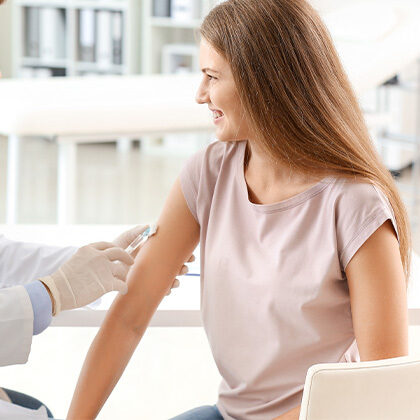
HPV Vaccine
HPV vaccines are an effective prevention tool for the human papillomavirus. The vaccination series for children can begin at age 9. Adults vaccinations are most effective for individuals age 26 and younger but can be approved for adults up to age 45.
Contact your primary provider to schedule an HPV vaccine or reach out to Schneck Primary Care to discuss scheduling.
What is HPV?
The Human Papillomavirus (HPV) is a sexually transmitted infection (STI), that is spread through vaginal, anal, or oral sex with an infected person. As the most common sexually transmitted infection, HPV can affect anyone, manifesting in several different ways.

Low-risk HPV can lead to warts that appear as small or large bumps in the genital area. High-risk HPV, such as HPV16 and HPV18, may cause cancer in the cervix, vagina, vulva, penis, or anus. While most people may be carrying HPV in their bodies, there is no test to determine whether a person is currently infected.
Symptoms such as warts or the development of cancer are usually the first indications that a person is infected with the virus. Avoiding HPV begins by observing safe sex practices such as using a condom or limiting sexual partners and preventative measures such as obtaining a vaccination early.
About the HPV Vaccine
Research for the first HPV vaccine was started in 1990 by Professors Ian Frazer and Jian Zhou at the University of Queensland in Australia.
By 2006, the initial vaccine had undergone extensive testing and was approved for use in Australia and the United States. It offered 100% immunity against HPV 16 and HPV18, some of the most aggressive high-risk types of HPV.
Variations of the initial vaccine have since been created in an effort to improve its effectiveness. Gardasil 9, approved for use in 2014, offers a wider range of protection that includes the majority of low-risk and high-risk HPV types including HPV6, 11, 18, 31, 33, 45, 52, and 58.
Gardasil 9 is currently the only vaccine being utilized in the United States.
Get the HPV Vaccine
Early vaccination is the best way to prevent contracting HPV. Adults should speak to their primary care doctor to schedule an appointment. Parents seeking an HPV vaccination for their children under the age of 18 should contact their child's pediatrician to discuss their eligibility and schedule an appointment.
Don't have a primary care physician? Scheck's primary care providers are ready to serve you.
Meet Our DoctorsWho is Eligible for the HPV Vaccine?
HPV vaccinations are usually recommended for young children in an effort to strengthen immunity before exposure becomes possible. Despite that, adults are also eligible.
- Children - Vaccinations are ideal between ages 11 and 12 but can be administered as early as age 9.
- Adults - Vaccinations are recommended for adults up to age 26 but can be obtained up to age 45.
HPV FAQs
Persons beginning their vaccination before age 15 only require two doses.
Persons beginning their vaccination after age 15 may require up to three doses. Speak to your primary care physician to understand what your vaccination schedule may look like.
While the vaccine protects against 90% of HPV types, it is still possible to become infected with a less common type despite being vaccinated. Regular cervical screenings are recommended for women in an effort to detect symptoms early. Regular cancer screenings are recommended for men as well.
Individuals exhibiting symptoms of HPV are still recommended to become vaccinated if they are within the ideal age group of 9 to 26 years of age. An HPV vaccination may protect them against other high-risk types of HPV they may not have encountered yet.
There are no treatments for the virus itself but instead for the symptoms it causes. Most symptoms are curable.
Yes, the symptoms of HPV are treatable. Genital warts caused by low-risk HPV can be treated by your healthcare provider. Cancers caused by high-risk HPV are also treatable using various common cancer treatments.
HPV is not hereditary but can be passed to an infant through contact with surfaces that carry the HPV virus.
Questions?
Concerns about vaccinations and their effects are perfectly normal. We encourage you to reach out to us directly should you have any concerns prior to scheduling your appointment.
We're here to answer your questions.

